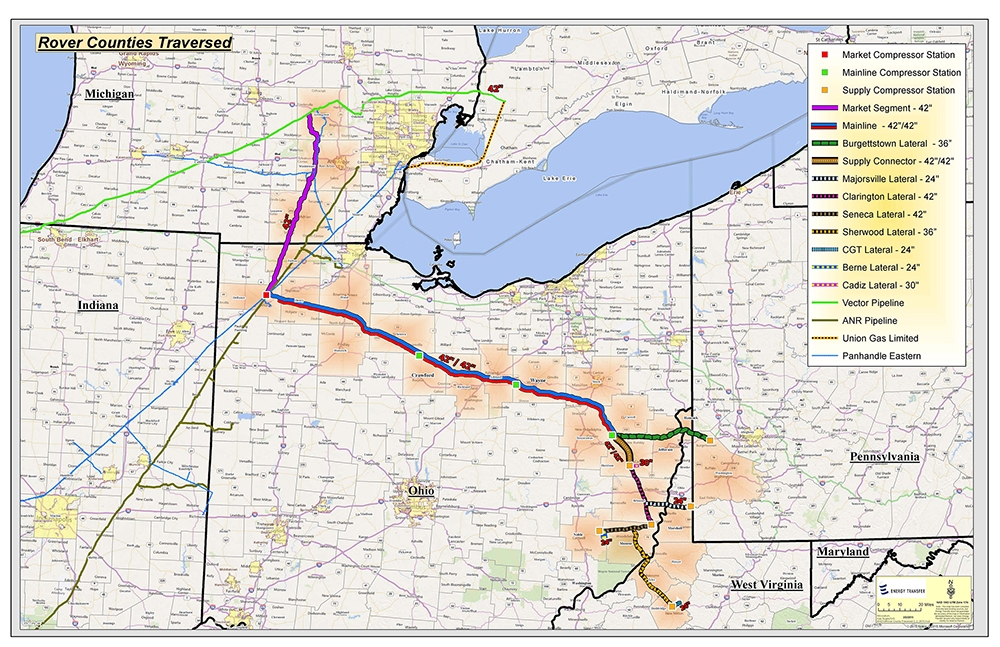Energy Transfer Partners, the company behind the Dakota Access Pipeline, has stepped in it- again. Thus far, their construction of the $4.2 billion Rover natural gas line has caused seven industrial spills, they’ve been fined more than $914,000 for environmental violations in Ohio, polluted fragile Ohio wetlands, angered local farmers and the company also owes $1.5 million in restitution after demolishing an historic house. 1
RELATED ARTICLES:
- 600,000 Gallons of Oil Spilled from a Texas Pipeline One Week Before DAPL Is Approved
- Massive North Dakota Oil Leak Proves Native American Protesters Right For Fighting ILLEGAL DAPL Pipeline
The EPA in Ohio is furious and a federal energy regulator has “launched a rare public investigation that threatens to delay the pipeline’s scheduled Nov. 1 completion.” 2 Glad to hear it.
All these problems with another pipeline and it hasn’t even been completed yet!
Rover started out 2016 on a high:
- Former Texas Governor Rick Perry was a company director before he became Energy Secretary.
- President Donald Trump is a former shareholder.
- After just two weeks in office, Trump cleared the way for the Dakota Access Pipeline 3
But things flatlined rather quickly:
- Energy Transfer disregarded a FERC recommendation and razed the 173-year-old ‘Stoneman House’ in Carroll County, Ohio.
- Rover’s construction coincided with heavy rains so when crews had to drain excess water and find a way to dispose of it, they did so on farmers fields. “Between April 5 and May 8, the Ohio EPA cited Energy Transfer at least 16 times for improperly disposing of sediment-laden water in streams.” 4
- On April 8, workers reported an “inadvertent release” of the fluid used to lubricate drills: non-toxic bentonite clay and water. By the time responders from the Ohio EPA arrived 2,500 square feet of wetlands were filled with drilling fluid. “Whatever lived in the wetland was suffocated beneath a foot or more of bentonite clay mud and subsequently suctioned up by vacuum trucks,” said Ohio EPA spokesman James Lee. 5
- Later in April, work crews noted at least three times that drilling fluid was again disappearing: in total, 119,000 barrels of drilling fluid had disappeared, enough to fill 145 rail cars, in a hole that could only accommodate 7,000 barrels. On April 13, they found about 40 percent of it had settled on 500,000 acres of pristine wetland. “The affected wetland will likely not recover to its previous condition for decades,” Lee said in an interview shortly after the incident. 6
- FERC said water-quality testing later found that the fluid contained traces of toxic diesel fuel, a potential violation of the project’s construction permit.
Energy Transfer claims they are cooperating with regulators but according to Craig Butler, director of the Ohio EPA, the company has rejected attempts to settle violations and flat out refused to pay $700,000 in civil penalties (that’s why the number is now over $900,000). In fact, Butler said the company’s response had been “‘dismissive,’ ‘exceptionally disappointing’ and unlike any other response he has seen from a company in his 27 years at the agency.” 7
Butler asked FERC Chairman Cheryl LaFleur to intervene so FERC barred Energy Transfer from any new drilling pending an assessment and began their probe into the spills. Whether or not that investigation results in civil penalties, delays or additional investigations by other agencies, remains to be seen.
The good news is that normally the agency keeps investigations private unless regulators can prove wrongdoing. At this point, it doesn’t seem likely that the agency will revoke Rover’s construction permit, but the FERC can still slow the project down. And maybe, just maybe, it will be enough time for someone to pay attention to what’s been going on and stop this madness before it gets much, much worse.












